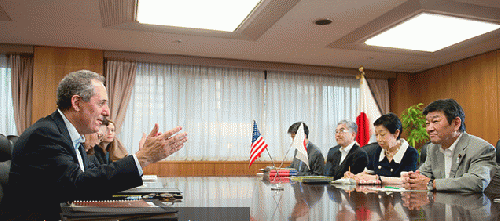Reprinted from yesmagazine.org

United States Trade Representative Michael Froman negotiates with Japan's Toshimitsu Motegi
(Image by U.S. State Department / William Ng.) Details DMCA
United States Trade Representative Michael Froman negotiates with Japan's Toshimitsu Motegi. Photo by U.S. State Department / William Ng.
President Obama is currently pressing members of Congress to pass Fast-Track authority for a trade and investment agreement called the Trans-Pacific Partnership (TPP). If Fast Track passes, it means that Congress must approve or deny the TPP with minimal debate and no amendments. Astonishingly, our lawmakers have not seen the agreement they are being asked to expedite.
The rulings of these tribunals pre-empt national laws and the decisions of national courts.
The TPP is presented as an agreement to increase U.S. exports and jobs. But what is really at stake is democracy--in the United States as well as in the 11 other Pacific Rim countries that are parties to the TPP.
Given past agreements on which the TPP is modeled, including the North American Trade Agreement (NAFTA), TPP provisions will likely have significant implications for nearly every aspect of American life--including intellectual property rights, labor and environmental protections, consumer safety and product labeling, government procurement, and national resource management. Given the way these agreements are crafted, we can be quite certain that the implications will favor corporate profits over human well-being. And once the agreement is approved, its provisions will trump national and local laws, including the U.S. Constitution, and will not be subject to review or revision by any national legislative or judicial body--including the U.S. Supreme Court.
It is expected that the TPP will include an Investor State Dispute Settlement provision that gives foreign corporations the right to sue governments for lost profits due to laws--such as environmental standards and safeguards for workers--they claim deprive them of revenue they might otherwise have received. Such claims are settled in tribunals comprised of trade lawyers whose identities are secret. The rulings of these tribunals pre-empt national laws and the decisions of national courts and are not subject to review by any national judicial or legislative body.
Also in the mold of NAFTA and similar previous pacts, the TPP is being drafted in secret. The main players at the negotiating table are trade officials from the party countries and representatives from the world's largest global corporations.
Since negotiations began in 2005, the public, press, and members of Congress and their staff have been denied access to the TPP meetings and to drafts of the agreement. In stark contrast, according to a 2014 report by The WashingtonPost, 566 advisory group members can view and comment on proposals. Of these members, 480 represent industry groups or trade associations and dominate the most important committees.
The secret gatherings of unelected government officials and corporate representatives in which agreements like the TPP are negotiated have become de facto transnational legislative bodies, drafting international laws the democratically elected legislative bodies of signatory countries then rubber stamp.
President Obama's assurance that this time will be different carries little credibility.
Because such sweeping provisions supersede the U.S. Constitution, one might expect that their approval by the U.S. Congress would require the same high bar as a constitutional amendment. At a bare minimum, approval should be subject to the same review, debate, and approval process considered essential for any normal piece of legislation. Yet our elected representatives have time after time voted to approve such agreements under expedited rules that trade away the rights of people in favor of the rights of global corporations.
President Obama recently appeared on Seattle's KOMO TV news making the claim that the TPP will expand U.S. exports, thus creating jobs and opportunities for small businesses. President Bill Clinton, Vice President Al Gore, and President George W. Bush all made the same promises on similar previous agreements.
But expanded trade not only means more exports; it also means more imports. Previous similar agreements have produced greater growth in U.S. imports than growth in U.S. exports. The result is a net loss of jobs, especially industrial jobs with good pay and benefits, and the closure of many small businesses. President Obama's assurance that this time will be different carries little credibility, based on this historical experience.
These agreements are written by global corporations such as Wal-Mart, Monsanto, Goldman Sachs, Citibank, ExxonMobil, British Petroleum, HSBC, and JPMorgan. These companies are not in the business of creating jobs and benefiting small businesses. They are in the business of maximizing their own profits. In regard to small businesses, the agenda is to capture their markets, buy them out, or squeeze them to the bone as captive suppliers and contractors.
Because these trade and investment agreements are not in the public interest, their corporate and governmental sponsors go to great lengths to keep the negotiations secret. If the TPP provisions were truly beneficial, there presumably would be no need to press the members of Congress to expedite approval under Fast Track rules before the public and members of Congress have seen the text.
Members of Congress will surely receive copies of the TPP documents before their final vote on the actual agreement. But these agreements are typically more than a thousand pages of detailed legalese meaningful only to experienced trade lawyers. If past experience is any guide, our lawmakers will have little time to read the agreement, let alone do a meaningful assessment of its implications or discuss it with constituents before it is called to a vote.
(Note: You can view every article as one long page if you sign up as an Advocate Member, or higher).




